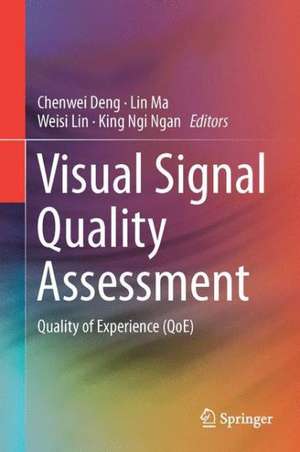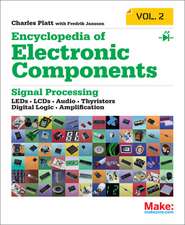Visual Signal Quality Assessment: Quality of Experience (QoE)
Editat de Chenwei Deng, Lin Ma, Weisi Lin, King Ngi Nganen Limba Engleză Hardback – 27 noi 2014
Preț: 647.59 lei
Preț vechi: 761.87 lei
-15% Nou
Puncte Express: 971
Preț estimativ în valută:
123.91€ • 129.73$ • 102.53£
123.91€ • 129.73$ • 102.53£
Carte tipărită la comandă
Livrare economică 07-21 aprilie
Preluare comenzi: 021 569.72.76
Specificații
ISBN-13: 9783319103679
ISBN-10: 3319103679
Pagini: 302
Ilustrații: XII, 302 p. 73 illus., 52 illus. in color.
Dimensiuni: 155 x 235 x 20 mm
Greutate: 0.62 kg
Ediția:2015
Editura: Springer International Publishing
Colecția Springer
Locul publicării:Cham, Switzerland
ISBN-10: 3319103679
Pagini: 302
Ilustrații: XII, 302 p. 73 illus., 52 illus. in color.
Dimensiuni: 155 x 235 x 20 mm
Greutate: 0.62 kg
Ediția:2015
Editura: Springer International Publishing
Colecția Springer
Locul publicării:Cham, Switzerland
Public țintă
Professional/practitionerCuprins
Introduction – State of the play and challenges of visual quality assessment.- How passive image viewers became active multimedia users: New trends and recent advances in subjective assessment of Quality of Experience.- Recent Advances in Objective Image Quality Assessment.- Quality assessment of mobile videos.- High Dynamic Range Visual Quality of Experience Measurement: Challenges and Perspectives.
Notă biografică
Chenwei Deng received the Ph.D. degree in signal and information processing from Beijing Institute of Technology, Beijing, China, in 2009. He is currently an Associate Professor at the School of Information and Electronics, Beijing Institute of Technology. Prior to this, he was a postdoctoral Research Fellow in the School of Computer Engineering, Nanyang Technological University, Singapore. He has authored or co-authored over 50 technical papers in refereed international journals and conferences. He was awarded the titles of Beijing Excellent Talent and Excellent Young Scholar of Beijing Institute of Technology in 2013. His current research interests include multimedia coding, quality assessment, perceptual modeling, and pattern recognition.
Lin Ma received his Ph.D. degree in Department of Electronic Engineering at the Chinese University of Hong Kong in 2013. He received the B. E., and M. E. degrees from Harbin Institute of Technology, Harbin, China, in 2006 and 2008, respectively, both in computer science. He is currently a Researcher in Huawei Noah’s Ark Lab, Hong Kong. He got the best paper award in Pacific-Rim Conference on Multimedia 2008. He was awarded the Microsoft Research Asia fellowship in 2011. He was a finalist to HKIS young scientist award in engineering science in 2012. His research interests include visual quality assessment, super-resolution, restoration, compression.
Weisi Lin received the Ph.D. degree from King’s College, London University, London, U.K. He is currently an Associate Professor and Associate Chair (Graduate Studies) with the School of Computer Engineering, Nanyang Technological University, Singapore. He has published over 270 refereed papers at international journals and conferences. His current research interests include image processing, visual quality evaluation and perception-inspired signal modeling. He is a senior member of IEEE, and a fellow of IET.
King Ngi Ngan received the Ph.D. degree inelectrical engineering from Loughborough University, Loughborough, U.K. He is currently a Chair Professor with the Department of Electronic Engineering, Chinese University of Hong Kong, Shatin, Hong Kong. He holds honorary and visiting professorships with numerous universities in China, Australia, and South East Asia. He has published extensively, including three authored books, six edited volumes, over 300 refereed technical papers, and has edited nine special issues in journals. He holds ten patents in image or video coding and communications. He is a fellow of IEEE, IET and IEAust.
Lin Ma received his Ph.D. degree in Department of Electronic Engineering at the Chinese University of Hong Kong in 2013. He received the B. E., and M. E. degrees from Harbin Institute of Technology, Harbin, China, in 2006 and 2008, respectively, both in computer science. He is currently a Researcher in Huawei Noah’s Ark Lab, Hong Kong. He got the best paper award in Pacific-Rim Conference on Multimedia 2008. He was awarded the Microsoft Research Asia fellowship in 2011. He was a finalist to HKIS young scientist award in engineering science in 2012. His research interests include visual quality assessment, super-resolution, restoration, compression.
Weisi Lin received the Ph.D. degree from King’s College, London University, London, U.K. He is currently an Associate Professor and Associate Chair (Graduate Studies) with the School of Computer Engineering, Nanyang Technological University, Singapore. He has published over 270 refereed papers at international journals and conferences. His current research interests include image processing, visual quality evaluation and perception-inspired signal modeling. He is a senior member of IEEE, and a fellow of IET.
King Ngi Ngan received the Ph.D. degree inelectrical engineering from Loughborough University, Loughborough, U.K. He is currently a Chair Professor with the Department of Electronic Engineering, Chinese University of Hong Kong, Shatin, Hong Kong. He holds honorary and visiting professorships with numerous universities in China, Australia, and South East Asia. He has published extensively, including three authored books, six edited volumes, over 300 refereed technical papers, and has edited nine special issues in journals. He holds ten patents in image or video coding and communications. He is a fellow of IEEE, IET and IEAust.
Textul de pe ultima copertă
This book provides comprehensive coverage of the latest trends/advances in subjective and objective quality evaluation for traditional visual signals, such as 2D images and video, as well as the most recent challenges for the field of multimedia quality assessment and processing, such as mobile video and social media. Readers will learn how to ensure the highest storage/delivery/ transmission quality of visual content (including image, video, graphics, animation, etc.) from the server to the consumer, under resource constraints, such as computation, bandwidth, storage space, battery life, etc.
- Provides an overview of quality assessment for traditional visual signals;
- Covers newly emerged visual signals such as social media, 3D image/video, mobile video, high dynamic range (HDR) images, graphics/animation, etc., which demand better quality of experience (QoE);
- Helps readers to develop better quality metrics and processing methods for newly emerged visual signals;
- Enables testing, optimizing, benchmarking, monitoring, and inspecting systems and services related to visual QoE.
Caracteristici
Provides an overview of quality assessment for traditional visual signals Covers newly emerged visual signals such as social media, 3D image/video, mobile video, high dynamic range (HDR) images, graphics/animation, etc., which demand better quality of experience (QoE) Helps readers to develop better quality metrics and processing methods for newly emerged visual signals Enables testing, optimizing, benchmarking, monitoring, and inspecting systems and services related to visual QoE
















